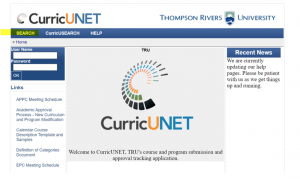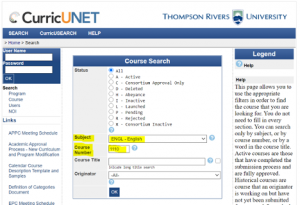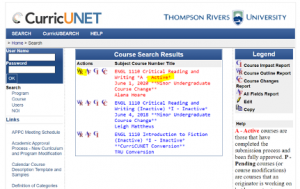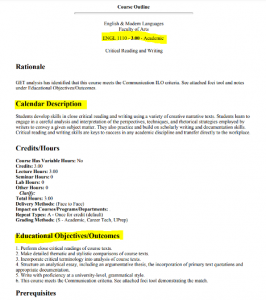2 Learning outcomes at TRU
Courses at TRU have Senate approved course descriptions and learning outcomes.
Faculty members plan their classes with the same learning outcomes in mind, no matter how they choose to structure their sections or which textbooks they use.
The most up to date learning outcomes can be found in an open, searchable database called CurricUNET.

Select the Subject code and enter the Course Number.

Click on the Course Outline Report of the last Active course.

You will see a course outline with an approved calendar description and learning outcomes.

Use TRU Senate approved learning outcomes to plan your course as a whole.
You can further focus your course by creating learning outcomes for each course section (Week/Unit/Module/Lesson). By providing learning outcomes often, you stay on track and you let your students know the purpose of each section.
The course’s learning outcomes and your intentions for the course (e.g., student experience) should guide each of the subsequent decisions you make, such as technology.
Identify the essential learning outcomes (LOs) for your course; course topics can be used here if you don’t have learning outcomes ready yet. Often, many less important LOs or topics need to be removed due to space and time limitations in the course.
Examples of learning outcomes:
- Justify the mechanism of the reactions in the course using experimental evidence to compare possible reaction pathways
- Demonstrate how evolutionary and ecological processes interact
- Determine whether a given drug candidate is expected to be orally bioavailable; justify your decision
- Use the definition of the derivative to find the derivative of a function and check your answer using the quotient rule
Divide the learning outcomes into modules

Dividing the LOs into modules, sections, or chapters will break up the course into manageable chunks. Students will need opportunities to hear/see the important information (e.g., short lectures), practice, and receive feedback (e.g., problem sets with answer keys, quizzes, assignments, exams).
To go deeper
If you choose to transform topics into LOs, here is a guide from the University of Waterloo that can help.
Up next
The knowledge, skills, and values that students should measurably demonstrate by the end of a section/module, course, or program.

